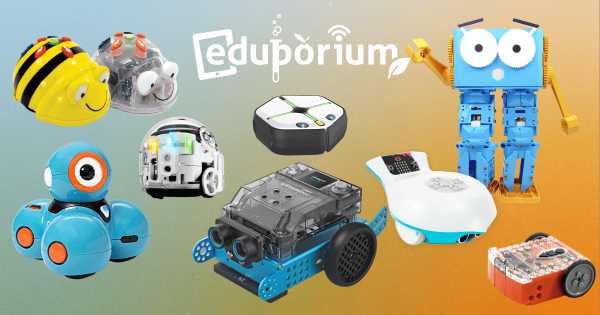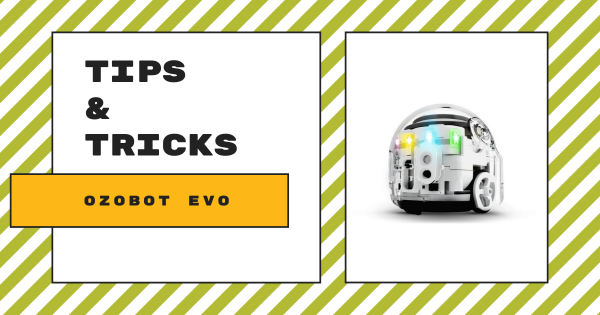The Dash Robot is one of the most recognizable and effective STEM tools available to tech educators. Its friendly face, bright blue surface, and value in coding education help make it a go-to option in classrooms, STEM labs, and makerspaces in countless elementary schools. And, with plenty of fun coding features, teacher-friendly resources, and more, it’s easy to see why.
Robotics
Some of the most popular paths and effective approaches to preparing students for their future involve using robotics tools. A significant subsection of STEM education, coding robots and other types of programmable devices enable a large percentage of the STEAM learning that occurs in our schools. Using educational robotics tools, students from Pre-K to college can develop key coding skills. This is largely because, among these various robot kits, many are compatible with various programming languages. So, beginning in Pre-K, a child might use the Cubetto Robot in screen-free coding activities. Then, they might move on to the Bee-Bot or Blue-Bot for CS experiences that are slightly more complex. And, by the time they're in kindergarten or first grade, they have a legitimate foundation and they're ready to continue developing fluencies in coding, problem solving, and even computational thinking.
One reason robotics in education is so effective is due to various advances in robotics equipment for schools. Beyond introducing the absolute basics of coding early on (and without a screen), students can then progress to one of the most basic forms of coding, which you might know as Blockly. So many robotics tools incorporate the Blockly coding language along with their corresponding programming environment. In fact, the Ozobot Evo, Root Robot, Edison Robot, and Dash Robot are among the most popular elementary robotics tools. These help children build on coding and technology knowledge as they prepare for the next step—text programming. In text coding, they can use tools like the databot 2.0, NAO Robot, and most of the others we've mentioned. And, through these experiences, they can develop STEM skills in a tangible way while using robotics tools to do so.
-
Teacher Talk | Robots & Social-Emotional Health
The skills kids acquire through hands-on STEM activities can help prepare them to show resilience or emotional intelligence when they face adversity as well as helping them learn to navigate modern-day challenges. Dr. Pam Davis founded pop-up makerspace company, Wellbotics, and learned this early on. Here, she talks SEL, social justice, embodied learning, and more. -
Eduporium Experiment | Bee-Bot Emulator
Coding with the Bee-Bot Emulator works just like programming your actual Bee-Bot Robot but is completely separate from the main Bee-Bot app. The digital platform even displays the directional buttons in the same ways and plays the same sounds to help create familiarity and continuity for children. Plus, the emulator is accessible online without downloads or installations. -
Eduporium Experiment | databot Robot 2.0
Like the original databot Robot, the databot 2.0 is square in shape but it is not a perfect cube unlike that original model. The newer databot is shorter in height, making it a much more compact robotics tool. More importantly, it’s also outfitted with 16 powerful on-board sensors that students can use to measure anything from light levels to air -
Eduporium Experiment | Finch Robot 2.0
The Finch 2.0 and its range of classroom-friendly features help teachers to create more accessible STEM experiences for students who might learn in different ways. There’s also a huge range of options for using the Finch 2.0 to introduce children to coding. Starting in kindergarten with FinchBlox and up through high school with Java, the Finch 2.0 helps provide lots -
Eduporium Experiment | Marty The Robot V2
The Marty V2 is ideal for students in Grades K-8 since they can easily build their bots themselves. This helps teachers incorporate in-class engineering experiences as well as enabling children to better connect their heads and hands throughout that building process. Once it is built, students can then explore opportunities for different types of coding with this compact robot. -
CS And Robotics For Elementary Students: The Best Tools To Use
There are so many classroom robots that teachers could access and share with students—even those in the elementary grades. Whether they’ve tried coding in kindergarten or they’re just getting started, these are some of the top elementary robotics kits to consider for your classroom. From the Dash Robot to the Finch 2.0 and the Marty V2, here’s why we like -
Tips & Tricks | The Ozobot Evo Robot
Students can program with their Evo in two unique ways: screen-free using color codes, markers, and paper or using the OzoBlockly environment on a device. Plus, for STEAM teachers, the Ozobot Classroom LMS offers them an incredibly smooth instructional experience and it’s super helpful when it comes to tracking student progress and monitoring their assignments. -
STEM And SEL In Classrooms: Exploring The Relationship
Starting with teaching skills like creative problem solving, persistence, and collaboration, merging these two key elements of education can really help students learn to enjoy the productive struggles they’ll likely face in a tech-driven world. So, we’re exploring how teachers can combine SEL, EdTech, and the right attitudes to help kids become well-rounded problem solvers. -
Using The EdSketch Pen Holder In Edison Robot Programming
The EdSketch add-on for coding with the Edison Robot is a really low-tech STEAM accessory and one of the latest additions to our store. Like each of the EdCreate Packs, it’s a super engaging and beneficial expansion kit that helps you scale up any Edison Robot lesson. And, both of those EdSketch products (the EdSketch Bundle and EdSketch Pens) are













